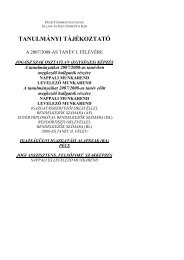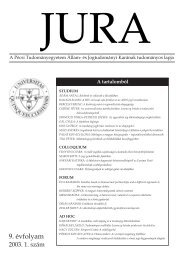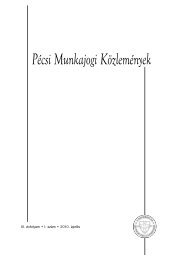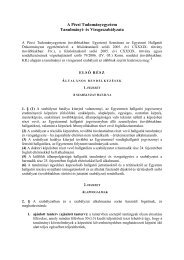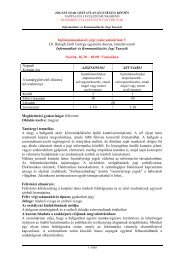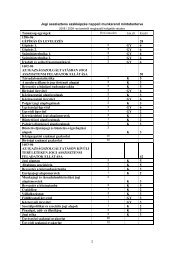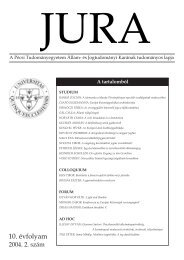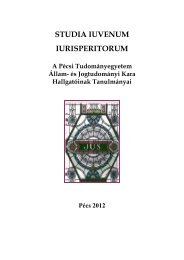2012. évi 2. szám - Jura - Pécsi Tudományegyetem
2012. évi 2. szám - Jura - Pécsi Tudományegyetem
2012. évi 2. szám - Jura - Pécsi Tudományegyetem
- TAGS
- jura
You also want an ePaper? Increase the reach of your titles
YUMPU automatically turns print PDFs into web optimized ePapers that Google loves.
André Ramos Tavares: The case of the borderless use of Constitutional Courts decisions in human rights179tion being repeated. The Court must emphasize allthe elements of the reasons behind its decision andshow their pertinence relative to the case and to thenational solution.Suppose, for example, that several decisionshanded down by a foreign constitutional jurisdictionupholding the constitutional right to bear arms wereidentified as being decisions reiterated from Americancourts. Suppose, further, that in most of the reasonsreference were made to a large part of Americandoctrine, as well as to American judicial precedent.Suppose, further still, that it became evident that thedecision of the Supreme Court of the United States,in the same sense, were based exclusively on anoriginalist approach (grounded in the interpretationof the time of the drafting of the Constitution, at theend of the18 th Century). Why should nations withrecent constitutions that were provoked into handingdown contemporary judicial decisions follow a justificationthat privileged practices and understandingsfrom the end of the 18 th century and beginning of the19 th century, especially if the application of the veryoriginalism by these young nations reveals that theintention of these recent constitutional gatheringswas precisely to banish this practice?Any decisions taken by constitutional jurisdictionsthat fulfill a political rationality of their countriesand that present a clearly visceral and unrepeatablepreoccupation to resolve the theme, should berejected once this process to verify incompatibilitieshas been performed.Moreover, countries with distinct constitutionalmodels, like monarchies and republics, parliamentarianismand presidentialism, federalism, regionalismand unitarism, should be more careful in theiruse of foreign elements only as concerns questionsconnected to these constitutional options.Another difficulty lies in knowing about whichforeign elements there can be dialogue, a difficultypresented by reason of the constellation of ConstitutionalCourts to which access is currently possibleand, more than this, the number of decisions that canbe consulted and debated.It is also possible to glimpse other criteria that thecourt in question might use, such as consulting onlythe most controversial questions and taking part indialogue relative thereto (or the least controversial,which demonstrates that this very theme is, in itself,equally controversial). The dialogue could also bereduced to more recent questions (which can alsobe an impeditive factor for States that are pioneersin tackling the theme, due to the non-existenceof consultable decisions). It is equally possible topropose dialogue when the texts used as the basisfor determining whether a dialogue is relevant areidentical or very similar in their wording, lay-out andpurpose, making any consultation of the interpretedrule more accessible than it would be in situationswhere there were greater semantic and teleologicaldistancing.Any one of these hypotheses, however, requiresto be made abundantly clear, should any come to beadopted, and a certain temporal consistency regardingthe criteria is expected from the ConstitutionalCourts. Even the criteria for the selection of jurisdictionsand subjects can be arbitrary, transforming theselection into an opportunity to reinforce decisionsalready taken, thereby rendering the dialogue merelyapparent. It is necessary always to show that it is not aquestion of seeking only those foreign constitutionalelements that conform to the actual (“pre”-) conceptionof the Court; what is required, rather, is a certain“honest transparency”.4. The problems in and of Sunstein’sproposalSunstein (2009: 7) suggests an approach to whichhe proposes an initial question: “if many peopleaccepted a specific perception on some importanttheme, should not the Supreme Court and othercourts, upon reflecting on the meaning of the Constitution,consult on this point of view?” For Sunstein,the debate about whether the Supreme Court of theUnited States should or should not use decisionsfrom other nations has been transformed, to a largeextent, into a discussion on the weight that should begiven to the position of the “many minds” (Sunstein,2009: 8, 189).Sunstein defends that the use of foreign constitutionalcase law should be avoided except undervery exceptional conditions, which he identifies. Heproposes, therefore, that the United States, in general,should pay heed only to national sources. In his opinion,it sounds wrong to take into consideration thepoints of view of those who cannot vote in nationalelections and who were not elected by the people “inreference” (Sunstein, 2009: 190). Democracy, here,would appear to negate the legitimacy of developingfundamental rights.Consultation of foreign constitutional case lawcould, however, occur (the observation is, above all,made for the Supreme Court of the United States)for the purposes of obtaining “relevant information”and, in this sense, foreign constitutional elementswould be justified for questions of a factual nature.Sunstein avails himself of the famous case, alreadycited in this study, of the death penalty foryoung offenders, the unconstitutionality of whichJURA 2012/<strong>2.</strong>



